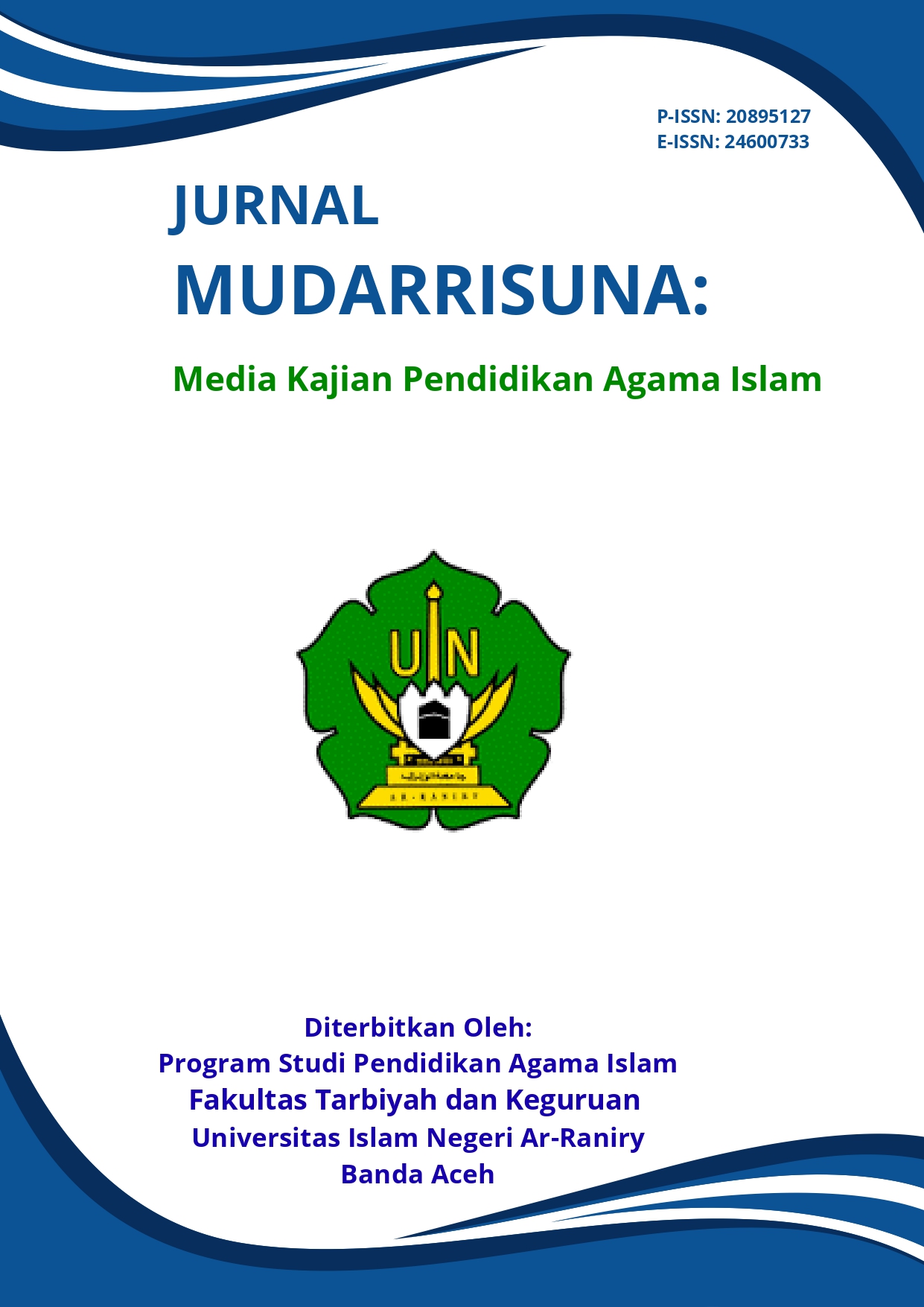EPISTIMOLOGI PENDIDIKAN ISLAM (Suatu Kajian Tentang Toleransi Dalam Perspektif Epistemologi Pluralistik)
DOI:
https://doi.org/10.22373/jm.v15i1.27819Keywords:
Epistemology, Islamic Education, Tolerance, Pluralistic EpistemologyAbstract
Education should be a tool to respect human dignity, prepare individuals to be able to live in this world and interact with others, education cannot be understood in one single interpretation. Therefore, Islamic education has an important role in supporting or even threatening plurality, ethnic, religious and cultural diversity in Indonesia. Pluralistic epistemology is a view that emphasizes the value of tolerance towards differences and diversity. Pluralistic epistemology assumes that there is no one approach that can explain everything, and there is no single source of truth that can be used as a benchmark. Pluralistic epistemology emphasizes the importance of accepting and respecting the differences and diversity of perspectives that exist in society. This research is a study of the epistemology of Islamic education which aims to discuss tolerance from a pluralistic epistemological perspective. This research was carried out with a descriptive approach through a literature review or theoretical study by studying journals or books related to the epistemology of Islamic education, while data analysis was carried out using the content analysis method. The results of this research show that tolerance in a pluralistic epistemological perspective emphasizes the importance of respecting diversity of views and different ways of understanding truth. According to the pluralistic epistemological approach, there are various methods for obtaining truth and knowledge. In this context, tolerance does not only mean respecting differences, but also openness to listening, understanding and respecting various existing views, whether in the realm of religion, culture or belief. In education, the application of pluralistic epistemology has a significant impact on the development of inclusive attitudes, mutual respect and a deep understanding of diversity. With this approach, Islamic religious education, for example, can become more open and less dogmatic, providing space for students to develop a broader understanding of various religious and cultural perspectives. This also contributes to the creation of a more tolerant, harmonious society, and is able to reduce potential social conflicts originating from differences in beliefs and traditions. However, it is important to remember that although pluralistic epistemology values multiple perspectives, the non-negotiable basic principles of religion must still be maintained.References
Akrom, M. (2019). Pendidikan Islam Kritis, Pluralis dan Kontekstual. CV Mudilan Group. https://books.google.co.id/books?id=3AjMDwAAQBAJ
Amirul, I. M., Anwar, S., & Hanif, M. (2019). Nilai-Nilai Pendidikan Ahlak yang Terkandung pada Novel dengan Judul Ayahku Bukan Pembohong Karya Tere Liye. Vicratina: Jurnal Pendidikan Islam,http://riset.unisma.ac.id/index.php/fai/article/view/3385/3068
Bidayah. (2018). Studi Ilmu-Ilmu Keislaman, Volume 9, No. 2, Desember 2018, hlm. 169.
Chanifah, N. (2020). Model Pembelajaran Pendidikan Agama Islam Berbasis Direct Experience-Multidisciplinary.
Dakir & Ahmad Fauzi. (2019). Epistemologi Pendidikan Islam Rahmatan Lil’alamin di Era Revolusi Industry 4.0; Sebuah Kajian Paradigmatik. Edureligia: Jurnal Pendidikan Agama Islam. Vol. 3, No. 2, Juli-Desember 2019.
H. Risdiany & D. A. Dewi. (2021). Penguatan Karakter Bangsa Sebagai Implementasi NilaiNilai Pancasila. Jurnal Pendidikan Indonesia, 2(4), 2021, h. 696–711.
Hani Zahrani, Anwar Dhobith, & Rubini. (2022). Kajian Teoritis Epistemologi Pendidikan Islam. Al-Manar : Jurnal Komunikasi dan Pendidikan Islam - Volume 11, Nomor 2, Desember.
Hasruddin Dute, M. Zainul Hasani Syarif dan Yunus. (2021). Islam dan Pluralisme Pendidikan Agama. Al-Riwayah: Jurnal Kependidikan Volume 13, Nomor 2, Oktober, https://e-jurnal.iainsorong.ac.id/index.php/Al-Riwayah.
Jazirotu Zamzam, Mahasin Haikal. (2023). Epistemologi Pluralistik Pendidikan Agama Islam Perspektif Abdurrahman Wahid, Yupa: Historical Studies Journal Vol. 7 No. 1, (61-72) http://jurnal.fkip.unmul.ac.id/index.php/yupa.
Mahrus & Moh. Elman. (2020). Kerangka Epistemologi (Metode Rekonstruksi Pendidikan Agama Islam). Rabbani: Jurnal Pendidikan Agama Islam, Volume 1, Nomor 2, September. http://ejournal.iainmadura.ac.id/index.php/rabbani/index
Makki. (2019). Epistemologi Pendidikan Islam: Memutus Dominasi Barat terhadap Pendidikan Islam. Al-Musannif: Jurnal Pendidikan Islam dan Keguruan. Vol. 1, No. 2 (July-December 2019): 110–124.
Misrawi, Z. (2017). Al-Qur'an dan Kitab Toleransi. Jakarta: Gramedia Widiasarana Indonesia.
Mumin, A. (2018). Pendidikan Toleransi Perspektif Pendidikan Agama Islam (Telaah Muatan Pendekatan Pembelajaran di Sekolah). Al-Afkar, Vol. 2 (1), 15-25.
P. Y. A. Dewi. (2020). Perilaku School Bullying Pada Siswa Sekolah Dasar. Edukasi: Jurnal Pendidikan Dasar, 1(1). h. 39–48.
Pujiyono, D. (2022). Menghadirkan Sosok Inspiratif dalam Praksis Pendidikan di Sekolah. Penerbit P4I. https://books.google.co.id/books?id=cBx9EAAAQBAJ
Raudhatuz Zahrah. (2021). Memberdayakan Epistemologi Pendidikan Islam. Jurnal Ilmu Pendidikan dan Keagamaan. Volume 5 No 2 April-Juni. Available online http://jurnal.uinsu.ac.id/index.php/eduriligia/index
Roziq Syaifudin. (2013). Epistemologi Pendidikan Islam dalam Kacamata Al-Ghazali dan Fazlur Rahman. Epistemé, Vol. 8, No. 2, Desember 2013.
S. Mashuri. (2020). Pendidikan Agama Islam Multikultural di Daerah Pasca Konflik (Studi Multisitus Integrasi Nilai Multikultural dalam Pembelajaran PAI di SMKN 1 dan SMAN 3 Poso Sulawesi Tengah).
Saihu, M. M., & Aziz, A. (2020). Implementasi Metode Pendidikan Pluralisme Dalam Mata Pelajaran Pendidikan Agama Islam. Belajea; Jurnal Pendidikan Islam, 5(1), 2020. https://doi.org/10.29240/belajea. v5i1.1037
Sulaiman. (2018). Penerapan Konsep Epistemologi Pendidikan Islam dalam Pandangan Al- Ghazali, Article · November 2018, https://www.researchgate.net/publication/329151811 , h.4
Downloads
Published
Issue
Section
License
Jurnal MUDARRISUNA: Media Kajian Pendidikan Agama Islam allows the author(s) to hold the copyright and to retain the publishing rights without restrictions. Authors who publish in this journal agree to the following terms:
- Authors retain copyright and grant the journal right of first publication with the work simultaneously licensed under a Creative Commons Attribution-ShareAlike 4.0 International License that allows others to share the work with an acknowledgment of the work's authorship and initial publication in this journal.
- Authors are able to enter into separate, additional contractual arrangements for the non-exclusive distribution of the journal's published version of the work (e.g., post it to an institutional repository or publish it in a book), with an acknowledgment of its initial publication in this journal.
- Authors are permitted and encouraged to post their work online (e.g., in institutional repositories or on their website) prior to and during the submission process, as it can lead to productive exchanges, as well as earlier and greater citation of published work.




